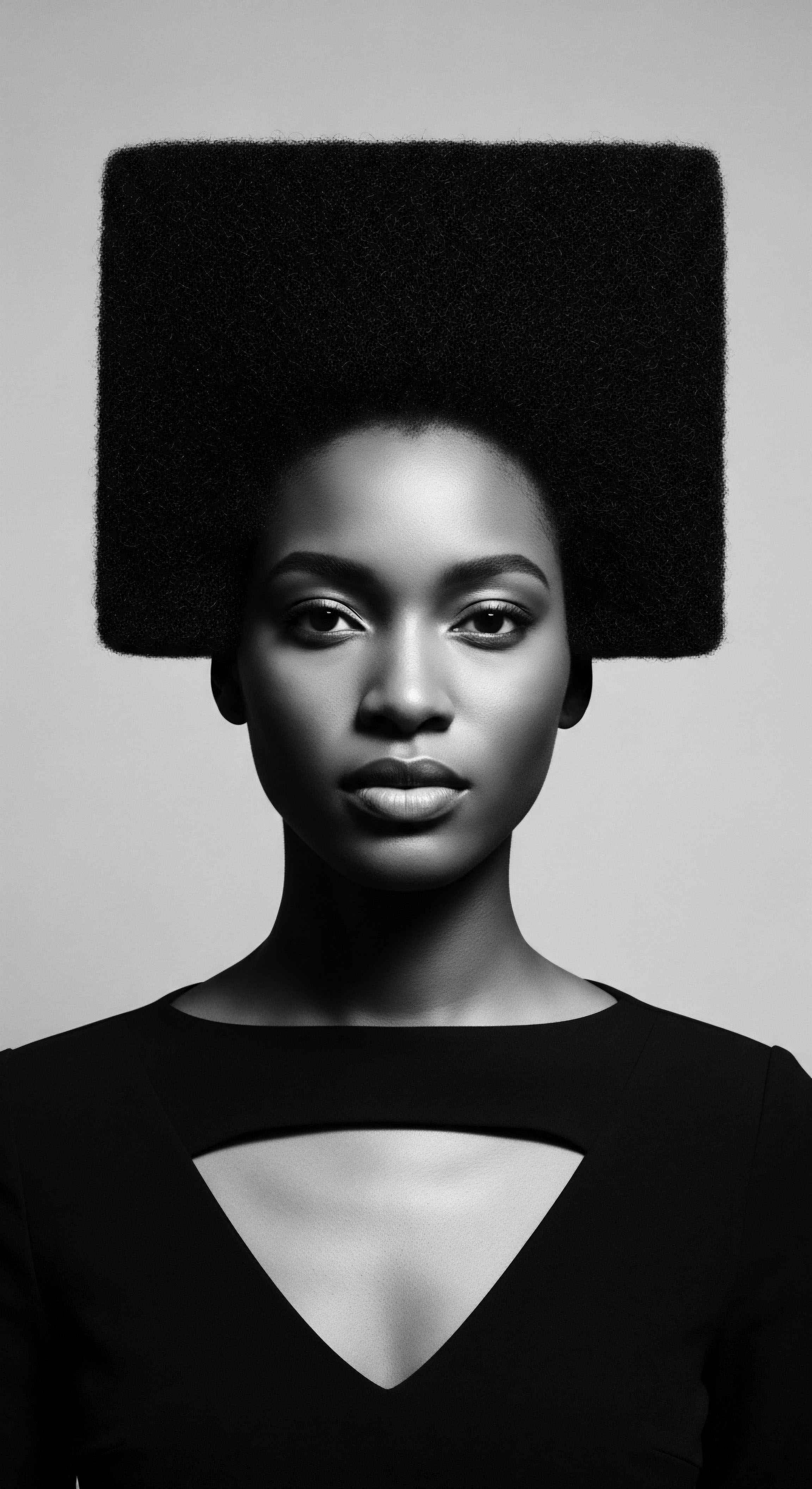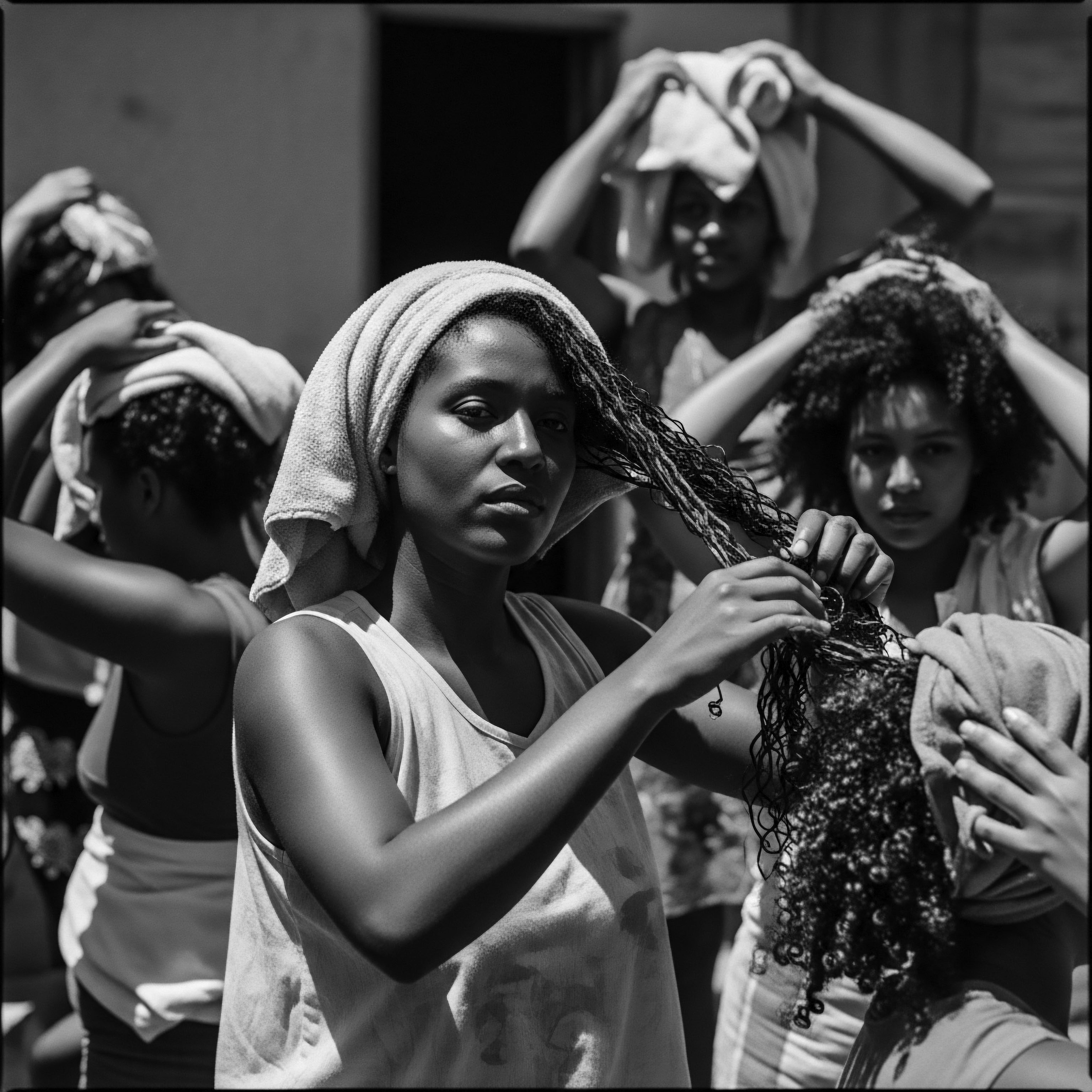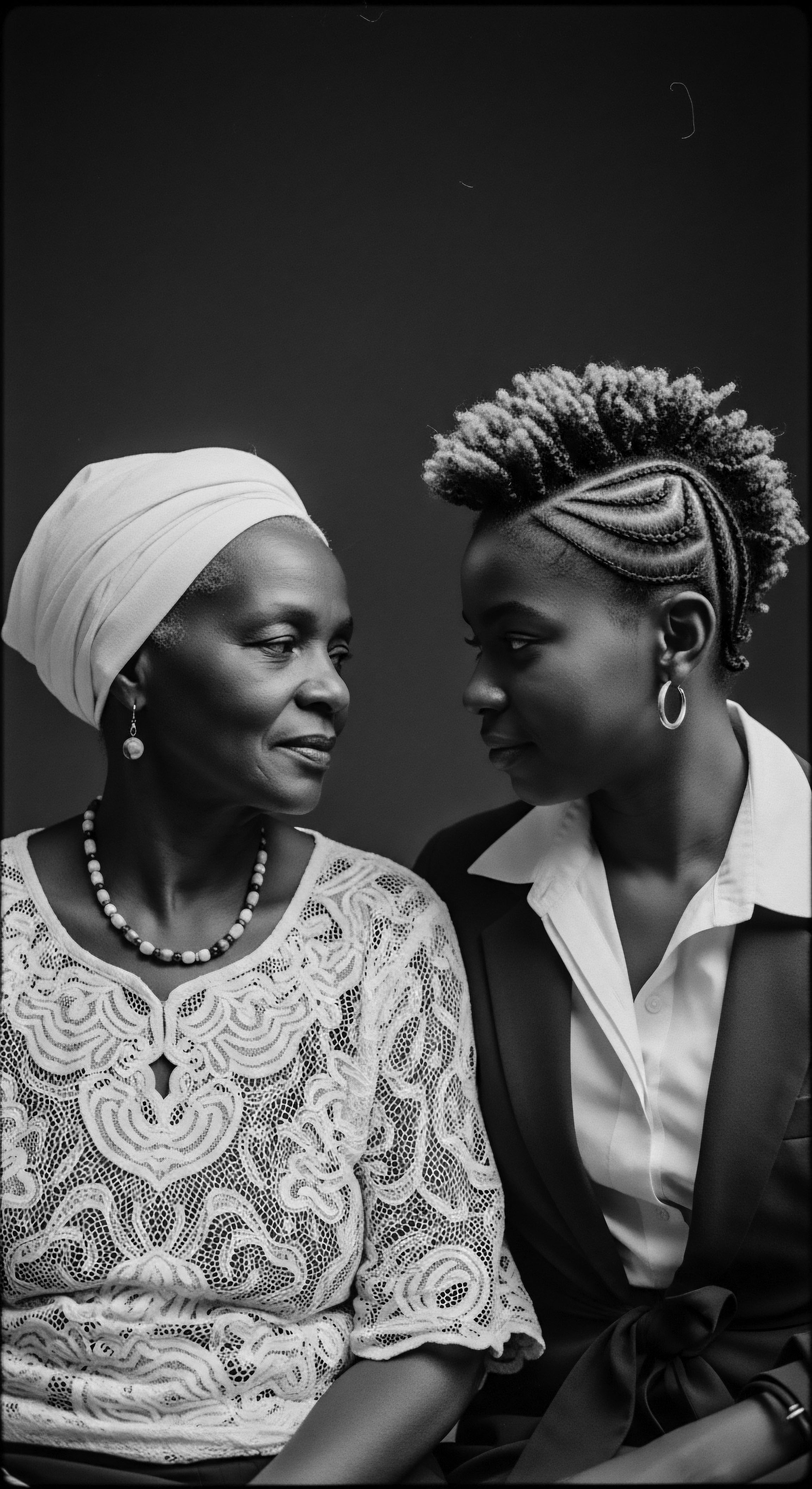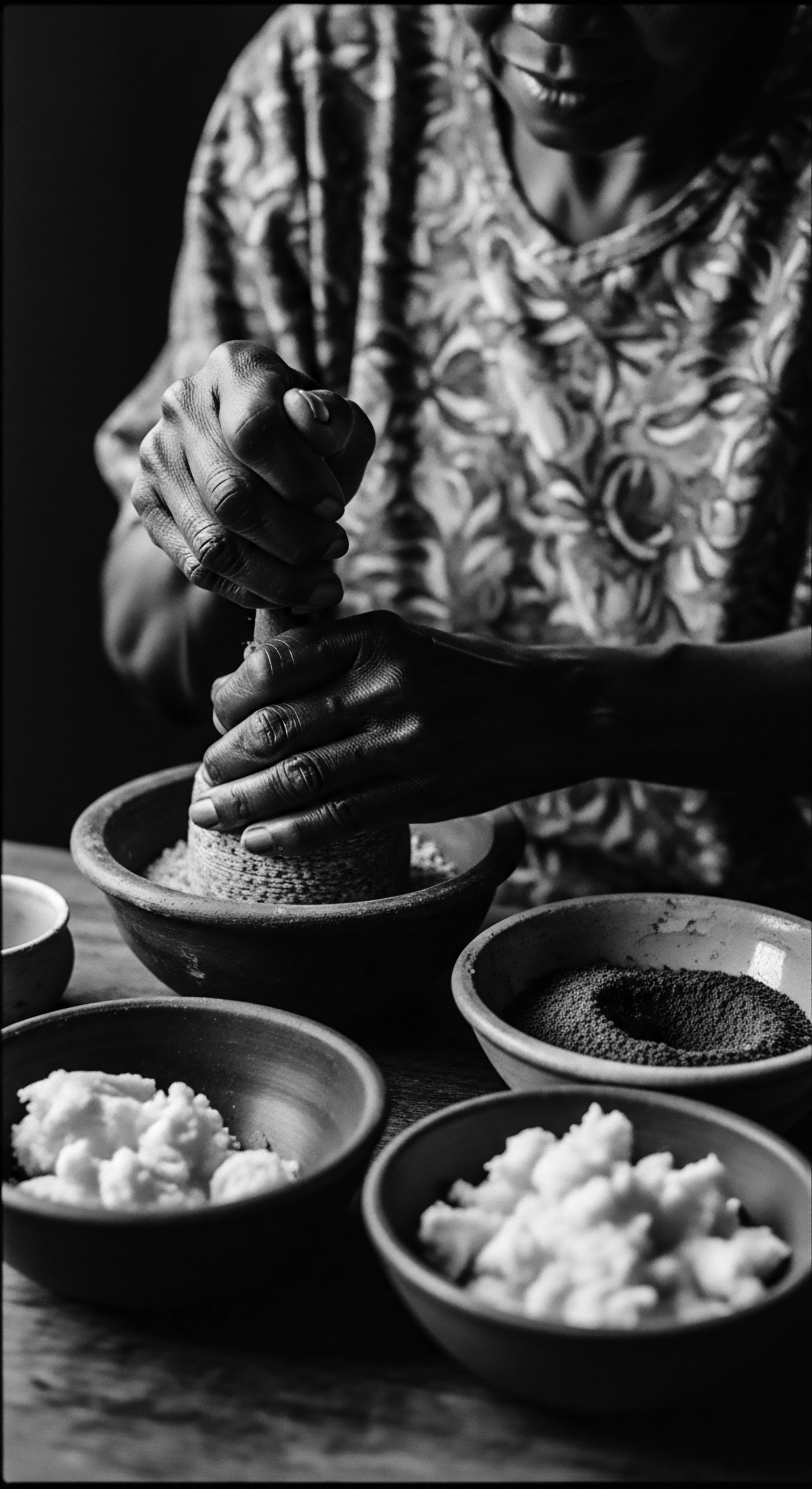
Fundamentals
The concept of Economic Empowerment Black Women resonates with a lineage as enduring as the deepest roots of an ancient baobab tree, signifying far more than a simple increase in financial standing. It speaks to the autonomous capacity of Black women to control their economic destinies, to direct resources, and to shape their livelihoods in ways that honor their ancestral pathways and communal well-being. This empowerment extends beyond individual accumulation, often radiating outward to uplift families, fortify communities, and preserve cultural legacies. It is a profound declaration of self-determination, woven from threads of resilience and innovation that have long characterized Black women’s experiences across the diaspora.
At its very core, the delineation of Economic Empowerment Black Women begins with recognizing the historical impediments faced ❉ systems of chattel slavery, Jim Crow laws, and persistent racial and gender discrimination ❉ that sought to deny Black women economic agency. Despite these formidable obstacles, Black women have consistently crafted avenues for financial independence, often leveraging their inherent ingenuity and communal bonds. Their entrepreneurial spirit, for instance, frequently manifested in the domestic sphere or through self-made trades that catered to specific community needs, many of which were overlooked by mainstream economies.
Economic empowerment for Black women signifies a self-determined control over financial destinies, profoundly shaped by ancestral resilience and community uplift.
Consider the elemental aspects of care within Black communities, particularly around hair. From ancient West African civilizations to the plantations of the antebellum South, hair has consistently held deep cultural and spiritual significance. The practice of hair care, the crafting of adornments, and the sharing of styling knowledge were not merely acts of beautification; they represented vital expressions of identity, community solidarity, and, critically, early forms of economic exchange.
Women who possessed specialized skills in braiding, twisting, or preparing nourishing tonics often became central figures, their hands transforming simple acts of care into tangible sources of value. These exchanges, though often informal, laid foundational groundwork for future economic endeavors rooted in beauty and wellness.
The earliest iterations of this empowerment were often informal, yet they held immense meaning.
- Bartering Systems ❉ Within enslaved communities, skilled hands that could braid intricate patterns or concoct nourishing elixirs were sources of informal exchange, trading services for goods, thus creating micro-economies of self-reliance.
- Market Gardeners ❉ Many Black women cultivated gardens, selling surplus produce directly to consumers, establishing early forms of direct-to-consumer entrepreneurship.
- Domestic Work ❉ While often exploitative, some domestic laborers found ways to leverage their skills, often forming networks for mutual support or offering specialized services (like laundering or cooking) independently.
The rudimentary understanding of Economic Empowerment Black Women at this foundational level emphasizes how basic needs and cultural practices intertwined to forge a path toward self-sufficiency, even when formal economic systems were actively designed to exclude them. It is a testament to the enduring human spirit to find ways to create value and sustain life, drawing deeply from shared knowledge and collective purpose. This understanding forms the bedrock upon which more complex layers of economic agency were built, always reflecting the indelible mark of heritage.

Intermediate
Moving beyond the elemental stirrings, the meaning of Economic Empowerment Black Women begins to assume more defined contours, revealing historical patterns of strategic resourcefulness and collective advancement. This period saw Black women not merely surviving but actively constructing economic frameworks within the margins of a society often hostile to their prosperity. The unique historical context of Black women in America, specifically post-Emancipation, brought forth a distinctive drive for economic autonomy, frequently catalyzed by the profound cultural significance of hair.
The late 19th and early 20th centuries witnessed a burgeoning of Black women’s entrepreneurship, a direct response to systemic neglect and racial prejudice. White-owned businesses often refused to serve Black patrons or offered substandard products, especially concerning hair and beauty care. This void became a fertile ground for Black women to cultivate their own enterprises, drawing on generations of inherited knowledge about natural ingredients, botanical remedies, and traditional hair manipulation techniques.
These ventures, while commercially driven, were also deeply communal, providing not only products but also employment, training, and spaces for social gathering. They were, in essence, laboratories of self-determination, powered by a collective aspiration for dignified living and financial independence.
The burgeoning of Black women’s entrepreneurship post-Emancipation, particularly in hair care, represented a crucial leap towards economic self-determination and communal uplift.
Consider the beautician, often the epicenter of these new economic ecosystems. The role of the Black beautician transcended mere styling; she became a confidante, an educator, and a community leader. Salons served as de facto meeting places, where information was exchanged, political discussions held, and mutual aid organized.
The economic activity generated within these spaces was a tangible manifestation of empowerment, circulating capital within Black communities and strengthening their overall resilience. These businesses were not simply transactional; they were relational, building social capital alongside financial capital, and reinforcing the inherent value of Black identity and aesthetic.
The entrepreneurial landscape of Black women was intricately linked to their heritage, particularly through their hair care practices.
- Formulation of Products ❉ Drawing from ancestral knowledge of herbs, oils, and natural cleansers used for centuries in African traditions, Black women created hair care products specifically tailored to textured hair, which was often misunderstood or neglected by mainstream markets.
- Training and Distribution Networks ❉ Pioneering figures established schools and agent networks, training other Black women in the art and science of hair care. These networks provided viable employment opportunities and fostered economic solidarity among women previously denied access to formal employment or business ownership.
- Community Wealth Building ❉ Profits from these enterprises were frequently reinvested into Black communities, supporting churches, schools, and other community organizations, thus demonstrating a circular economy of empowerment.
The profound significance of these developments cannot be overstated. They represent a period where Black women consciously leveraged their cultural understanding of hair, transforming it into a powerful engine for economic uplift. The hair salon, the beauty parlor, and the traveling agent became symbols of aspiration and achievement, defying the imposed limitations and forging a distinctive path toward collective financial freedom. This period clearly delineates how cultural heritage, when combined with entrepreneurial vision, could serve as a powerful catalyst for economic change, demonstrating how Economic Empowerment Black Women was actively constructed through lived experience and shared purpose.

Academic
The academic definition and meaning of Economic Empowerment Black Women transcends superficial understandings of financial gain, instead delving into a complex interplay of historical agency, systemic barriers, cultural reclamation, and communal wealth creation, particularly as expressed through the lens of textured hair heritage. From a scholarly perspective, this concept describes the processes by which Black women have strategically acquired, managed, and redistributed economic resources, not merely for individual benefit, but often with an explicit or implicit aim of collective advancement and the bolstering of Black communities against pervasive racial and gender oppression. This is a multi-layered phenomenon, requiring an analytical framework that considers both macro-level structural inequalities and micro-level manifestations of individual and collective resilience. It is an enduring testament to adaptability and an unwavering commitment to self-determination.
An intellectual inquiry into Economic Empowerment Black Women necessitates an examination of how cultural practices, specifically those surrounding textured hair, have served as unique conduits for economic agency. Historically, mainstream beauty industries either ignored or pathologized Black hair, creating a significant market vacuum. This void was not simply a business opportunity; it represented a profound cultural need, a yearning for products and practices that honored the inherent nature of Black hair, rather than attempting to conform it to Eurocentric standards.
Black women entrepreneurs stepped into this breach, often drawing upon ancestral botanical knowledge and traditional hair care rituals passed down through generations. These early businesses were not just commercial ventures; they were acts of cultural affirmation and resistance, providing economic pathways while simultaneously validating Black identity.
Academic analysis reveals Economic Empowerment Black Women as a multi-layered phenomenon where cultural practices, especially textured hair care, serve as profound conduits for economic agency and communal resilience against systemic oppression.
One cannot discuss the profound intersection of Economic Empowerment Black Women and hair heritage without acknowledging the transformative impact of figures like Sarah Breedlove, known to the world as Madam C.J. Walker. Her trajectory offers a compelling case study, not just of individual success, but of a deeply interconnected economic model rooted in understanding and serving Black women’s specific needs, particularly their hair and scalp health.
Often, academic discussions highlight her marketing prowess and her personal wealth accumulation. However, a deeper, less commonly cited interpretation underscores how Walker’s enterprise was a radical act of communal wealth building, directly responding to and validating the ancestral knowledge of Black women regarding hair care, and transforming it into a formal economic engine.
Walker’s genius lay not merely in developing hair-growing formulas, but in recognizing the profound psychosocial and economic implications of hair for Black women in the early 20th century. Her approach, termed the “Walker haircare system,” was meticulously developed to address common scalp ailments and hair loss prevalent among Black women, conditions often exacerbated by harsh lye-based straighteners and poor living conditions (Bundles, 2001). This was a direct response to a neglected health and beauty need, rooted in the biological realities of textured hair and the historical neglect it faced. More profoundly, she built an extensive network of thousands of commission-based agents, known as “Walker Agents” or “beauty culturists,” who were primarily Black women.
These women were not just sales representatives; they were trained professionals who traveled from house to house, demonstrating products, teaching proper scalp and hair care techniques, and providing essential health advice. This system generated income for countless Black women who had limited opportunities outside of domestic service or agricultural labor.
The economic significance of Walker’s model, viewed through a heritage lens, is multifaceted:
- Decentralized Wealth Distribution ❉ The agent system created an unprecedented decentralized network for wealth generation within the Black community. Thousands of Black women gained economic independence, allowing them to support their families, purchase homes, and contribute to their local economies, thus shifting capital flow within their own communities.
- Validation of Traditional Knowledge ❉ While Walker’s products were scientifically formulated, their very existence validated the deep-seated cultural importance of hair care within Black communities. Her innovations were perceived not as an abandonment of heritage but as an advancement of care practices to new levels of efficacy and accessibility. Her training programs often incorporated elements of holistic well-being, echoing ancestral wisdom that saw beauty as an extension of health and spiritual alignment.
- Community Infrastructure ❉ The economic gains from the Walker system contributed to the broader Black economic infrastructure. Many agents used their earnings to send children to historically Black colleges and universities (HBCUs), support civil rights organizations, or invest in other Black-owned businesses. This created a ripple effect of empowerment that extended far beyond individual financial betterment, reinforcing the foundational role of women in community resilience.
The impact of Walker’s model on Economic Empowerment Black Women is further contextualized by the era’s realities. In a society where Black women were often denied formal education and entrepreneurial opportunities, her business model offered a revolutionary pathway. It leveraged existing social networks and a shared cultural understanding of hair’s significance, transforming a common necessity into a powerful economic force. This approach highlights how entrepreneurial success for Black women often involved a deep understanding of their community’s unique needs and a commitment to collective uplift, embodying an economic philosophy that transcends mere profit.
The profound implication of this phenomenon lies in its demonstration of autonomous wealth creation as a form of social resistance and cultural preservation. The beauty industry, pioneered by Black women like Walker, became a sanctuary of economic self-sufficiency, a place where Black women could define their own standards of beauty and, by extension, their own economic value. This challenged dominant narratives of Black inferiority and dependence, asserting a powerful narrative of economic agency and cultural pride. The careful study of these historical instances provides essential data for understanding the enduring strength of Black women in overcoming systemic economic disenfranchisement, always with an eye toward ancestral wisdom and communal strength.
The societal contributions derived from the economic undertakings of Black women in the hair industry were not simply financial; they were deeply rooted in cultural sustenance. The creation of specialized products and services catered to the unique requirements of textured hair, celebrating its diversity at a time when societal pressures often dictated conformity to Eurocentric beauty standards. This fostered a sense of identity and self-acceptance, which, in turn, fueled consumer loyalty and further economic growth within Black communities.
The economic gains were intrinsically tied to a reaffirmation of heritage, demonstrating how culture and commerce could intertwine for mutual benefit and collective progress. The very act of caring for textured hair, informed by traditional methods and supported by Black-owned businesses, became a powerful statement of self-worth and autonomy, providing tangible economic rewards that reinforced cultural pride.

Reflection on the Heritage of Economic Empowerment Black Women
The journey of Economic Empowerment Black Women, particularly as it intertwines with the sacred domain of textured hair, is a living chronicle. It is not merely a historical account of overcoming adversity; it is a resonant echo from ancient practices, a tender thread woven through generations of care, and an unbound helix of identity shaping futures. This exploration leaves us with a profound understanding: the economic agency of Black women has consistently been an act of self-preservation and collective elevation, often finding its most powerful expression in the very strands that adorn their crowns.
From the communal scalp massages of ancient African villages to the bustling salons of the Harlem Renaissance, and continuing into the vibrant digital spaces of today, the connection between hair, heritage, and economic sovereignty remains unbroken. It speaks to a deep, abiding wisdom that recognizes the holistic nature of well-being ❉ where financial independence is inextricably linked to cultural pride, physical health, and spiritual alignment. The care of textured hair, once a subversive act in a world that denied its beauty, transformed into a powerful engine for economic self-determination. These are the narratives that allow us to appreciate the enduring ingenuity and unyielding spirit embedded within the very fiber of Black womanhood, a legacy of triumph sculpted by ingenuity and community.

References
- Bundles, A’Lelia Perry. On Her Own Ground: The Life and Times of Madam C. J. Walker. Scribner, 2001.
- Byrd, Ayana, and Lori L. Tharps. Hair Story: Untangling the Roots of Black Hair in America. St. Martin’s Press, 2001.
- Patton, Tracey Owens. African American Hair Story: Cultural and Economic Perspectives. Peter Lang Publishing, 2006.
- Rooks, Noliwe M. Hair Raising: Beauty, Culture, and African American Women. Rutgers University Press, 1996.
- hooks, bell. Sisters of the Yam: Black Women and Self-Recovery. South End Press, 1993.
- White, Deborah Gray. Ar’n’t I a Woman?: Female Slaves in the Plantation South. W. W. Norton & Company, 1985.
- Guy-Sheftall, Beverly. Words of Fire: An Anthology of African-American Feminist Thought. The New Press, 1995.
- Taylor, Ula Yvette. The Veiled Garvey: The Life and Times of Amy Jacques Garvey. University of North Carolina Press, 2002.





